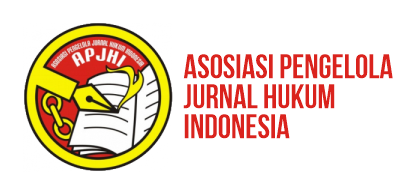Electronic Legality Of Employment Contracts On Minor Children
Abstract
Based on the results of the study, the answers to the existing problems were obtained, that the validity of the employment contract between Youtube and the content creator who was still underage in the statutory provisions contained four conditions for the validity of an agreement, one of which involved the ability to make agreements. Like the real world, there are several requirements from the electronic service provider that must be approved by social media users, especially a content creator. These requirements are commonly known as terms of service. One of the things that are usually regulated in the terms of service is the age of the user so that the legal relationship that exists between the child and the agency or institution is based on the existence of a working relationship between the two parties, in which the child can be represented by the parent or guardian based on a work agreement because children are still unable to carry out legal actions independently, this is because children are categorized as people who are not yet capable of carrying out legal actions As for government regulations regarding employment contracts between YouTube and content creators who are still underage, it can be seen in several laws and regulations in Indonesia which regulate the procedures for engagements or work contracts such as the Civil Code, the ITE Law and in the Manpower Act. For example, in the Civil Code, one of the things that can be used as a reference in the validity of a contract is age, namely 21 years or already married, so based on the problem formulation, the researcher gives an idea in the form of underage content creators who are required to be accompanied or represented by parents or guardians in entering into agreements or contracts with the youtube platform service provider so that it cannot damage the validity of the contract or agreement that has been made by the parties.
Keywords: Validity of Employment Contract, Content Creator Children.Full Text:
PDFReferences
Book
Mukti Fajar ND and Yulianto Achmad. Dualism of Normative & Empirical Legal Research . Yogyakarta : Student Library, 2015.
Journal
Alvin Daniel Silaban, et al. ( 2020 ) . Podcast: Broadcasting or Service of Audio Content Through the Internet (Over The Top) Based on Positive Laws in Indonesia. 13. No. 2 , 13
ArArviatastarini. ( 2019 ) . The validity of the Employment Agreement made by Minors. Legal Discourse, 25. No 1. 24
Emilda Kuspraningrum . ( 2011 ) . Validity of Electronic Contracts in ITE Law Reviewed From
Article 1320 of the Civil Code and the UNCITRAL Model Law On Electronic Commerce . Risalah HUKUM Fakultas Hukum Unmul. 7, No. 2 , 67
Fenty U. Puluhulawa, et al. ( 2020 ) . Legal Weak Protection of Personal Data in the 4.0 Industrial Revolution Era . JaJambaaw Review-Journal. 2. No. 2. 183
Kamaruddin, Aulia Fajriani, and Istiqamah Istiqamah. ( 2020 ). Observing the Legitimacy of E-Commerce Transactions Performed by Minors. Alauddin Law Development Journal, 2. No 3. 3
Pranisa, KS, Dantes, KF, & Sudiatmaka, K. ( 2021 ) . Analysis of the Validity of Agreements in Electronic Transactions Through Facebook Advertising Media Reviewed Based on Law no. 19 of 2016 concerning Amendments to Law No. 11 of 2008 concerning Information and Electronic Transactions . Yustisia Community Journal , 4 . No. 2, 227
DOI: https://doi.org/10.33756/eslaj.v2i2.13195
Refbacks
- There are currently no refbacks.
Copyright (c) 2022 Estudiente Law Journal

This work is licensed under a Creative Commons Attribution-NonCommercial-ShareAlike 4.0 International License.
| | | |
| | | | |
| | | | |
| | |
Estudiante Law Journal has been available at:
| | | | |
| | | | |
| | | | |
| | | | |




-2.png)
.png)





